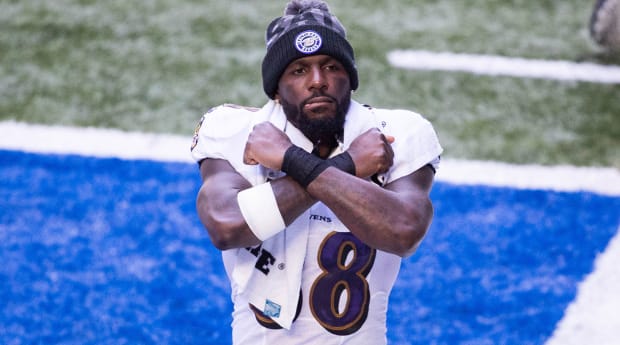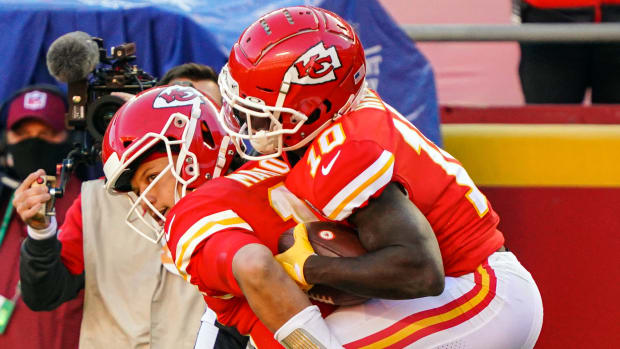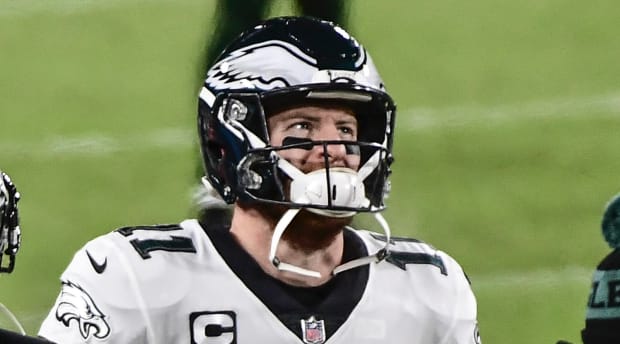The NFL faced a new situation, learning about Dez Bryant's positive test while he was warming up for a game. Here's how the NFL and the Ravens handled it.
The Baltimore staff was buzzing on the field pregame when some fairly stunning news came back. It was news that, even by 2020 standards, qualified as unprecedented. The immediate reaction from the coaches was interesting and twofold.
First, there was talk of the cruel irony of the situation, that Dez Bryant was the one who returned a positive COVID-19 test from Tuesday morning, and how a confluence of events—mostly the game’s being delayed and the Ravens’ proximity to the lab that processes the tests—had come together to take him off the field for a matchup against, of all teams, the Cowboys. Second, there was a simple question that perfectly illustrated the uncertainty of the circumstance.
Can we get Madubuike up?
Madubuike is rookie defensive tackle Justin Madubuike, the Ravens’ third-round pick. He, along with most of the other inactives, was at M&T Bank Stadium without any expectation that he’d play. But with Bryant unavailable, and Calais Campbell and Brandon Williams set to play through respective calf and ankle injuries, Baltimore figured its best use of the roster spot would be to add the big rookie and manage the vets through the night.
Then, after telling the Ravens it would be able to pull someone up to fill the 48th roster spot, the league reversed course and told them they couldn’t. So while the offensive coaches scrambled to figure out how they’d rearrange the personnel groupings—with tight end Mark Andrews and receiver Willie Snead out, and only four receivers dressed, the Ravens would be stretched thin—the defensive coaches doubled back to their original plan.
And in the midst of all this happening, one coach doubled back to that weirdness of Bryant’s being the one to bolster a larger point. The Ravens were planning to lean on him more than at any point this year, because of the skill-position depth issue, which set him up to have his biggest game since the Cowboys cut him three Aprils ago.
“Is there anything more 2020 than this?” the coach joked.

What followed was a very 2020 win—the Ravens, all 47 of them, locked in on six days’ rest and bludgeoned a Dallas team afforded a dozen days off, by a score of 34–17. The Cowboys, strangely enough, looked like the team that had been through a lot to get to game night.
The outcome of the game, considering those circumstances, underscored the big picture thought a lot of Baltimore people had coming out of it. You really couldn’t make up what happened on Tuesday.
***
Week 14 is here and, for now, we’re getting all the games as scheduled. And you’re getting the GamePlan as scheduled. In today’s column, you’ll find …
• A diagnosis of Carson Wentz’s issues, from teams who’ve faced him.
• A look at why coaches might be empowered come January.
• Power rankings!
But we’re starting with the story that made waves Tuesday night.
***
So how do you explain a team that had its lineup thrown in flux, with potential concern of somebody having COVID-19 being on the field, compartmentalizing all of it and rolling to 294 yards rushing (at a clip of 7.4 yards per carry) and a beatdown of Dallas over the three hours to follow?
“After everything we’ve been through, all of us—I mean, all of us—are very calloused to the whole thing,” said one Ravens staffer Wednesday.
Indeed, Baltimore’s been through plenty. The team’s facility was initially closed Nov. 23, the day after an overtime loss to Tennessee, after Mark Ingram and J.K. Dobbins tested positive, marking the first of 10 consecutive days with positive tests. The Thanksgiving-night game against Pittsburgh was moved to the night of Tuesday, Dec. 1, then the afternoon of Dec. 2. The Ravens closed their facility again after the Steelers game was postponed and returned for only a pair of masked walkthroughs before traveling (and losing) to Pittsburgh.
As a result of all that, the Dallas game, initially scheduled for Thursday, Dec. 3, was moved back five days, giving the Ravens time to recover, and the Cowboys double the rest that their opponent would get.
Baltimore went from calm water—they didn’t have a single player test positive between camp and the Turkey Day outbreak—into a tsunami. So when it started raining again, the fact that the team was already metaphorically drenched had a way of softening the blow. That’s not to say they could forecast what would come next. But they were ready when it did.
The way Tuesday went proves that. Here, then, is the blow-by-blow, according to NFL and Ravens sources.
• The deadline for players and staff to be tested at either the team facility in Owings Mills or the team hotel in the Inner Harbor was set for 11 a.m. Samples were picked up at the latter, then former, and were on the road to the lab in Gaithersburg, Md., a suburb of Washington, roughly an hour away.
• The samples arrived in Gaithersburg, Md., early afternoon. Generally, processing tests for a team takes around three to four hours. Since there are only five labs nationwide to process the tests, some teams have more of a lag in getting results—some teams don’t receive them until the following morning. Because the Ravens are local to a lab, they get them faster than most.
• Per league rules, teams have to submit their inactives 90 minutes before kickoff. In this case, kickoff was set for 8:04 p.m. ET, so Dallas and Baltimore had to get theirs in by 6:34 local time. The Ravens’ list was posted to Twitter right at 6:34 p.m.
• Fewer than 20 minutes later, Ravens officials were notified that Bryant’s test had returned from the lab inconclusive. Baltimore immediately called the league—the NFL and the team involved are routinely notified by the lab in such cases simultaneously—and summoned its team physician, Dr. Andy Tucker. What does it mean to have an inconclusive test? Per a league source, in this case, there was a very weak signal on Bryant’s test. Once GM Eric DeCosta got off the phone with the league, he got word down to coach John Harbaugh on the field.
• Within a couple of minutes, before 7 p.m. ET, the Ravens pulled Bryant off the field and got him to an isolation room at M&T Bank Stadium, and Tucker got on the phone with the NFL’s medical team, led by chief medical officer Dr. Allen Sills. Meanwhile, Ravens coaches put in the inquiry about filling the 48th roster spot.
• Shortly after 7 p.m., Bryant was administered a Mesa point-of-care test. Ten minutes after that, the Ravens and the league got a second email from the Gaithersburg lab, informing them that Bryant’s test had been rerun and came back inconclusive a second time.
• Just after 7:30 p.m., Bryant’s Mesa test came back positive, and the Ravens informed both the Cowboys and the Fox broadcast team that Bryant has been ruled out with an illness. Bryant didn’t waste time clearing up any confusion, tweeting at 7:35 p.m.: “Tell me why they pull me from warming up so I can go get tested … my s--- come back positive … I tested positive for Covid WTF.” As that was happening, DeCosta told Harbaugh that official word had come, and Harbaugh got his offensive coaches to start reorganizing personnel groupings and got word that they wouldn’t be able to dress Madubuike.
• The league launched its contact tracing process at 7:35 p.m., right as Bryant hit send on the tweet, and it took about 20 minutes for the NFL to clear everyone to play. In doing so, Sills and his team worked with reps from DICON and IQVIA. Their saving grace: The contact-tracing numbers on Bryant’s Kinexon tracking device were very low, in part because the Ravens had gone over the top to distance players after their previous outbreak.
• Kickoff came at 8:04, as scheduled. Eleven minutes later, Bryant tweeted the question everyone was asking: “Since I tested positive for Covid before the game do the game stop or go on?” Thanks to the results of the contact tracing—which took into account the tracking-device data and four primary factors (cumulative exposure time, distance, mask use and ventilation)—the game went on.
Ultimately, the result of the situation was a game getting played, just as a game got played eight days ago in Pittsburgh, amid player concerns over their readiness to go and whether the virus was truly contained. And that’s one thing the NFL has shown to all of us the last three months: If the games can be played, the games will be played.
That said, the league has stressed both publicly and privately that this situation might’ve been expedited, but it wasn’t handled any differently than one would be on some random Tuesday (and not just when they put games on Tuesdays). Every box needed to be checked, and the NFL and Ravens worked feverishly to check them all before kickoff, making it by—believe or not—fewer than 10 minutes.
“It’s the same process no matter who it is,” said one source. “Whether it’s Patrick Mahomes or a backup on the practice squad, it’s the same. In medicine, you’re looking at the patients, you’re not looking at the identity.”
The Ravens, to their credit, did much to make sure another situation like the one they faced during Thanksgiving week wouldn’t happen again, with Tucker’s and director of football administration Nick Matteo’s spearheading that effort. They sanctioned strength coach Steve Saunders for violating protocols. They were knocking down walls in their practice facility to create larger meeting space, before league mandates came in for teams to go to remote meetings. Of late, all players have been at the facility for is to pick up food, lift and practice.
Yet, there they were in the face of that tidal wave again on Tuesday, and with no guarantee that it’ll be the last one coming for them.
And no, there isn’t anything more 2020 than that.
***

POWER RANKINGS
1) Kansas City Chiefs (11–1): It’s felt for a little while now like the Chiefs have been the best team in the league. The Steelers’ stunner of a loss Monday night (or was it late afternoon?) cleared the way for me to rank them as such.
2) New Orleans Saints (10–2): Did you know the Saints are 8–0 with backup QBs starting the last two years? I came across that number earlier in the week. And of course, I knew how well they’d handled Drew Brees’s absences this year and last. But adding it up like that … that just doesn’t happen. It’s a credit to Sean Payton as a guru of the position of course, and also to Mickey Loomis, Jeff Ireland and Terry Fontenot for the roster-building that’s gone on there.
3) Pittsburgh Steelers (11–1): I know a lot of people are out on Pittsburgh right now, and the injuries at linebacker are definitely cause for concern. But this is still a stacked team. And with the schedule ahead over the fourth quarter of the season, it’ll be a tested one come January, too.
4) Green Bay Packers (9–3): Matt LaFleur’s won four of five (the loss was the wild one in Indy), and is on the fast track to keep the heat on the Saints for the NFC’s first-round bye (remember, there’s only one this year) with the schedule ahead.
5) Buffalo Bills (9–3): I’m not sure people really get how loaded the Bills are (everyone will get to see it on SNF this week). And if Josh Allen keeps playing like he did on Monday night, look out.
***

THE BIG QUESTION
What’s wrong with Carson Wentz?
To find out, I went to a bunch of different scouts and coaches who’ve evaluated and gone against him in 2020. A lot of stuff matched up from one guy to the next. So here’s a sampling of what came back …
Defensive coordinator 1: “I see a guy that’s indecisive and doesn’t trust his protection.”
NFC exec 1: “Not good man, erratic, inconsistent, bad decisions. Bad O-line and no commitment to the run game but he also holds the ball too long and makes it hard on them.”
NFC exec 2: “They don’t appear to have a plan or identity offensively, and he is struggling, obviously, with decision-making. They don’t have any weapons at WR. Two leading receivers can’t separate. Two good TEs but they have only played four games together. Think they have played with 20 different OL combinations. With all that said, they have had some success running the ball, but they don’t run the ball much. The old adage is the QB’s best friend is the running game. Wentz looks like his confidence is shot and his teammates can see it, so you wonder how much buy-in he gets from teammates. Still believe in him as a QB but they have to get more talent around him and buy into the running game. He is pressing and if he doesn’t make the plays they have no shot winning.”
NFC exec 3: “He was very uncomfortable in the pocket. Showed little poise and was not going through his progression. Really beat up and ineffective offensive line coupled with receivers who cannot separate is causing him to force balls. No vertical threat so teams will sit on their receivers and jump routes. He is not disciplined with his reads or technique but it is not just him. They need to run the ball, get Carson on the move and get the ball out quick.”
NFC exec 4: “Forcing things, relying on him to make and create plays and not a lot of help from protection … play call and run game, locks on to targets and inconsistent going through progressions, risky with the ball.”
Defensive coordinator 2: “Never seemed to build a chemistry with his receivers. Since his injury, has lost his foundation and mechanics, in my opinion. Needs to find more rhythm in his passing game instead of backyard football.”
My second question for these guys was whether Wentz is fixable—whether that’s for the Eagles or someone else to do it—and I got a mostly positive response on that one. “He is,” said the second NFC exec, “but they need not only to get healthy, but add weapons at receiver for him.” Added the first NFC exec, “I don’t know the person well enough, but he definitely has the physical tools. If he has the work ethic, discipline, is a good teammate, he could turn it around for sure. It depends on his makeup.”
And therein is where I got a little push back from the third NFC exec. Some of the problems, as he sees them, aren’t just isolated to this year.
“It’s hard to say on QBs,” he said. “He had some of those same traits in college—he’s talented but there were more mental, psyche concerns than physical ability.”
Which makes the way this thing goes from here very, very difficult to predict.
***
WHAT NO ONE IS TALKING ABOUT
Front office/coaching structure.
This is always a topic behind the scenes in the NFL, and, with a sudden flood of GM openings, it’ll be an even bigger deal this year. So allow me to offer an educated guess: I think you’ll see at least a few teams shift toward a more coach-friendly structure.
My guess is that both the Giants and Washington will at least kick the tires on doubling down on their 2020 hires, Joe Judge and Ron Rivera, by potentially bringing in executives they have backgrounds with.
There’s been speculation that Nick Caserio (whose extension in New England is said to be shorter-term than people realize) could go to the Giants, but I’d keep an eye on Titans scouting director Monti Ossenfort (who has a strong relationship with Judge from New England) as a New York target, whether it’s this year or a year or two down the road. And Rivera could pair with any one of a number of current and ex-Panthers personnel men (Tennessee’s Ryan Cowden would be one; Buffalo’s Joe Schoen is another).
And if another team with an opening coming goes coach-centric with its new model—the Jags are one team set up to do so, having already kicked the tires on it with Doug Marrone getting final say over the 53-man roster this year—it’ll be interesting to see whether dominoes start falling then.
The truth is, with the amount of change there has been over the last decade leaguewide, it’s harder to find obvious candidates than it once was. Which drives demand past supply. So if there’s competition for top guys, and some dangle the carrot of offering more power within the organization to lure them, it might make sense for others to follow suit.
For a lot of different reasons, this being one, 2021 promises to give us a fascinating hiring cycle.
***
THE FINAL WORD
Rams-Patriots should be fun, and I do think internally the guys in L.A. are excited to get this sort of measuring stick. Quietly, Sean McVay, Les Snead & Co. have moved toward a model that looks a little more like New England’s—the offseason trade-off of Dante Fowler for Leonard Floyd and A’Shawn Robinson is an example—and off the star-driven look that they rode to a Super Bowl with Jared Goff still on his rookie contract.
As a result, the Rams are becoming a more complete team, which allows the coaches to do more in the way of game-planning and play-calling. And, they hope, build the sort of sustainable operation that New England has had for more than two decades.